Hestia, the goddess of the hearth, home, and domestic life, was one of the most celebrated and honored Greek Goddesses. She had great significance in the day-to-day life of the people for her kind and decent nature.
She was responsible for teaching a man to build houses, so every house had a small part of Hestia dwells in every household. She is honored by the men as the protector and a teacher of their work.
Her life is little known in books and movies, yet it is full of interesting facts. Here is the list of the top 10 interesting facts of Goddess Hestia with details.
10. Hestia is the Goddess of the hearth, home, domestic life, and hospitality
Content
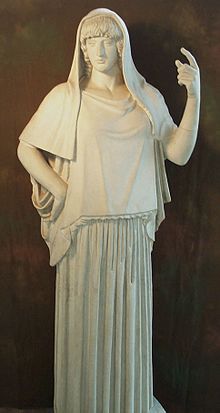
Zeus was the leader and the king of the gods and one of Hestia’s siblings. He, with other siblings, was on a mission to overthrow the Titans’ reign. Hestia joined the group and moved ahead with the mission.
All the siblings received particular posts and were assigned responsibilities by Zeus after winning over the Titans. Hestia, at that time, was assigned to feed the gods and maintain the fires of the Olympian hearth.
Thus, she became the Goddess of the hearth. She used the fires of the Olympian hearth to cook the fatty, combustible portions of animal sacrifices to the gods.
As the hearth belonged to food and cooking, the goddess represented domestic life and helped the Greeks cook food with fire. They were supposed to make an offering to Hestia every time they prepared the food.
Similarly, she taught the Greeks, especially the men, to build houses. The people were also taught ways to maintain peace in the family. Hence, she was associated as the goddess of home as well.
Apart from this, she was also the Goddess of travel and hospitality. Whenever people migrated, they carried a flame from the sacred hearth. They would think the fire of Hestia could keep them under her blessings.
9. Hestia was one of the virgin Goddesses
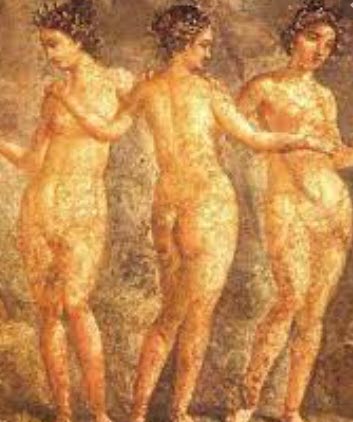
Hestia, Athena, and Artemis were the three virgin goddesses of the Greek religion. They were associated with hearth, wisdom, and hunt, respectively.
All three goddesses were blessed with beauty, charm, and wisdom, for that they were followed by many Greek gods, including Poseidon and Apollo. Poseidon, the god of the storm, asked Hestia to marry him, but she refused his proposal.
She was also proposed by Apollo, but he, too, was rejected. Instead, she asked Zeus to grant her eternal virginity hoping to stop the suitor’s fight. Her wish was granted, and she remained a maiden forever.
Priapus, a minor fertility god, tried to snatch her virginity during a celebration hosted by Goddess Rhea. The celebration was for the major victory of the Greeks over the Titans.
Hestia wasn’t interested in the party, so she went to the woods and fell asleep there. Drunk Priapus found Hestia and tried to rape her but was stopped by a braying donkey who woke Hestia up from her slumber.
Soon other Olympians arrived at the place and confronted Priapus. He was forbidden from attending celebrations since then. Also, the donkeys were rested and garlanded on Hestia’s feast day.
8. Hestia was the eldest and youngest daughter of Cronus
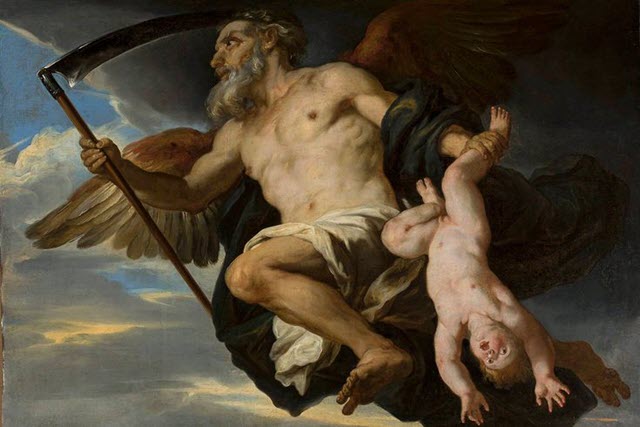
Hestia was born to Cronus and Rhea. Cronus ruled the earth as the king of the Titans and the God of time. His wife, Rhea, was associated with fruitfulness.
She was the first child of her parents, who saved five siblings, Poseidon, Hades, Demeter, Hera, and Zeus, from her mother.
Cronus would swallow all his children from the fear of being overthrown by them. He had a fear since the time Uranus warned him of losing his throne to his offspring.
However, Cronus’s son Zeus took the help of Metis and made Cronus drink a potion. The potion made Cronus emit out everything that he had swallowed. Luckily, all his children also came out along with other swallowed things.
Hestia was the last one to come out of Cronus hence she became the youngest. Hestia was the oldest child born humanly from Cronus and Rhea and the youngest child to be born from emittance.
7. Hestia’s sacred symbols were hearth and fire
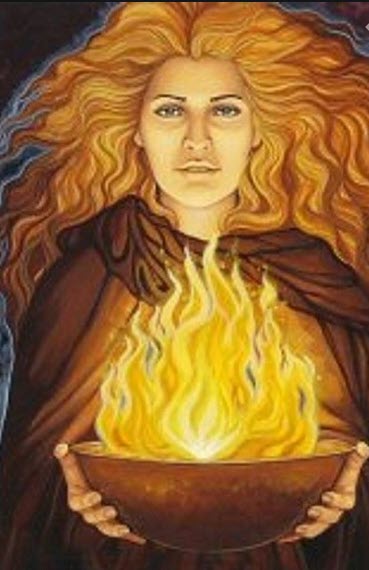
Hestia refers to “hearth, fireplace, and altar.” Thus, her sacred attributes are hearth and its fire. The hearth, along with its fire, was essential for warmth and food preparation. It was also necessary to complete the sacrificial offerings to deities.
Hestia also personified the fire burning in every Greek household. Her hearth fire was a blessing for the Greek people, and they kept it wherever they went.
Similarly, her hearth fire was collected before starting any work, including establishing the colony or new town, as a stroke of good luck. It was also used after the birth of a child, the child was carried around the fire and was then accepted by the family member.
This ritual ensured the Greeks that their child was blessed by goddess Hestia and would lead a healthy life thereafter.
6. Hestia is only little known in the books
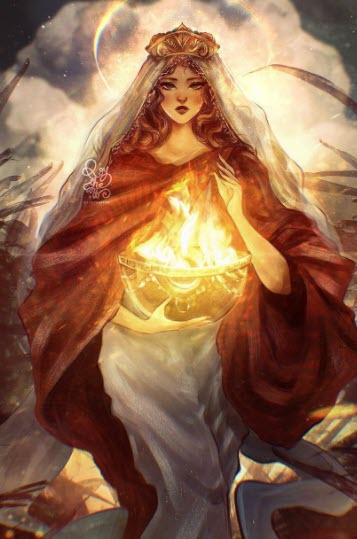
Hestia was the gentlest and mildest Goddess in Greek Religion. Critics have often called her colorless because of the little information provided regarding her character.
Though the goddess appeared in some stories, she wasn’t overly important in Greek mythology. Great poet Homer hasn’t mentioned her in the Iliad and the Odyssey.
Only some poets such as Apollodorus, Hesiod, and Ovid have alluded to her in their works.
5. Hestia received the first offering at every sacrifice in the household
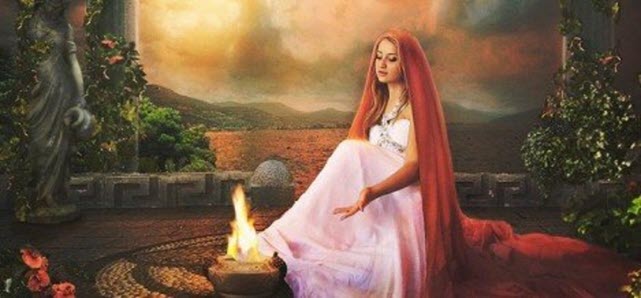
Hestia remained a virgin forever to end the war between Poseidon and Apollo. She took a vow of eternal virginity by placing her hand on Zeus’ head.
Zeus, being impressed, granted Hestia her everlasting chastity. He also granted her the central place in the house.
He granted Hestia’s hearth in every home. The first offering of every household was given to her. Each meal started and ended with an offering to her.
Also, Zeus allowed her to have a share in worship in all the temples. She could have the first portion of humans’ divine offerings.
To honor Hestia as the virgin Goddess, Greek people had built a temple. In that temple, six virgins were assigned to serve. The virgins had to keep their promise of everlasting chastity.
If any of chosen virgins broke the promise, they were served with great punishment. The punishment was to bury the virgins alive.
4. Hestia has Goddess Vesta as her Roman equivalent
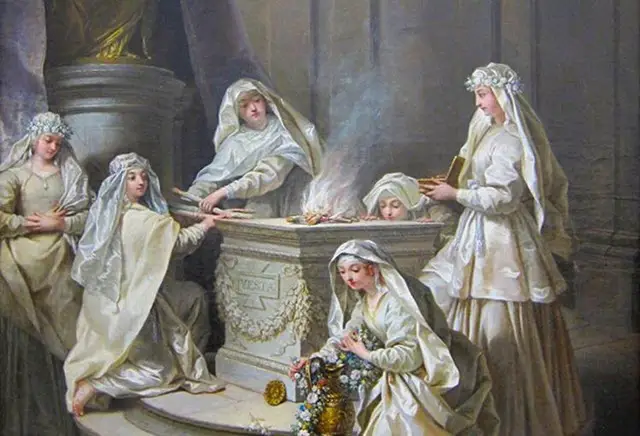
Greek Religion has some significant influence on Roman Religion. So, Romans also have Hestia in their version. They worship Vesta as the Goddess of the hearth, home, and family.
She was represented with the depiction of fire, and her cult was located in the Forum Romanum. Vestals were the assigned priestesses of that temple who looked after the sacred fire at the heart of the temple.
3. Hestia is portrayed as a modest woman wearing a veil and robe
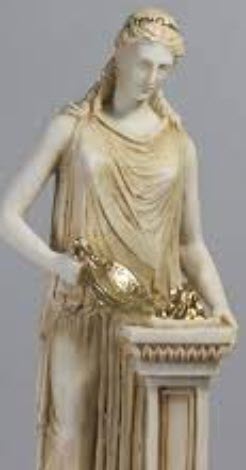
Hestia is described as a gentle, stable, serene, forgiving, and dignified virgin Goddess. Her domestic duties always bound her at mount Olympus. She was always absent from the scandalous and adventurous myths due to her great virtue.
She was identified with a physical object, the hearth. Also, her characteristics inspire the ideas of community and domesticity. But her portrayals are rare and seldom secure.
In classical Greek art, she is usually depicted as a modest middle-aged woman. She has a veil on her head and was shown standing by a large fire or carrying a light.
Similarly, she is also shown sitting on a plain wooden throne with a white woolen cushion.
2. Hestia is an alternative among the Twelve Olympian deities
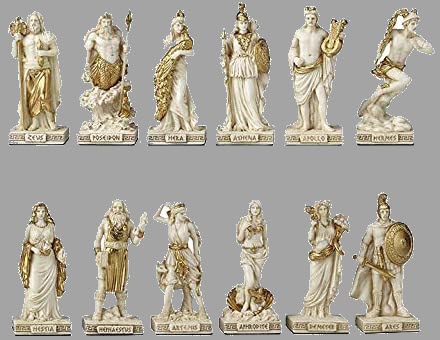
Hestia was the elder daughter of Cronus, so she had the right to preserve some more advantage. She was given space among members of the Twelve Olympians, the major deities of Greek Religion.
However, there was a discrepancy in the list of the twelve chief Olympians. It was also a dilemma either to choose Hestia or Dionysus, son of Zeus, and the other eleven.
Hestia was the gentlest Goddess in Greek Religion. She never fell into any controversy or scandal. She always wanted to keep peace in the house and society. Such generous virtue led her to be an alternative among twelve Olympian deities.
1. Hestia didn’t have a particular temple devoted to her
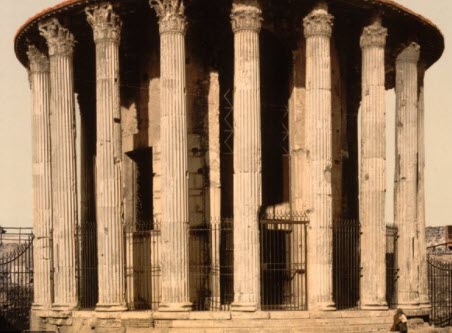
Hestia was one of the most celebrated and worshipped goddesses in the Greek religion. However, there were only a few temples or places solely dedicated to her.
Sparta and Ermioni were the only two places where her cults were built. People worshipped her in private and public hearths or “Prytaneion” in the city.
The flame in these city centers or private places was always kept alive. The accidental extinction of hearth-fire at home represented a failure of domestic and religious care for the family.
If it happened at a public hearth, it was a breach of duty to the broad community.
However, the flames could be extinguished by rituals if needed and re-lit after the purification, renewal, and completion rituals.
See Also:
- Top 10 Greatest Inventions and Discoveries of Ancient Greece
- Top 10 Most Important People in Ancient Greece
- 10 Ancient Gods of Underwater in Greek Mythology
- Top 10 Reasons for the Trojan War
Conclusion
Many gods and goddesses inspire people and other deities with their good deeds. Hestia, being the gentlest Goddess, also inspires others to be like her. She always looked to spread a peaceful environment all around.
I felt bad knowing that great authors overlooked Hestia. Even Homer has missed her. What do you think about it? Have you found anything that needs to be discussed more? The comment box is all yours.
